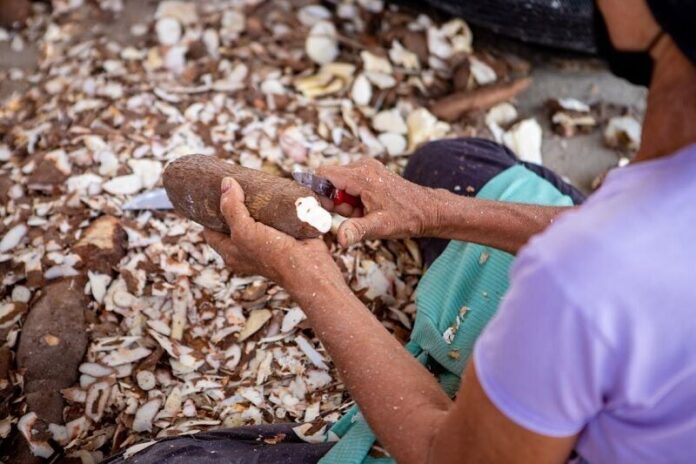Thai exports of cassava and cassava products fell by 16.4% year-on-year in the first quarter, largely due to a reduction in cassava chip output.
The Director-General of the Trade Policy and Strategy Office, Poonpong Naiyanapakorn, reported that the export value of cassava and cassava products reached 33.2 billion baht for the first three months of this year, marking a 16.4% decline from the previous year.
The export value for native starch stood at 18.1 billion baht, showing a significant increase of 49.1%, while modified starch exports amounted to 8.58 billion baht, up by 4.99%.
Other cassava products, such as chips, saw a drastic decline. The export value of chips totalled 5.93 billion baht, down 67.9%, cassava pellets dropped to 76.3 million baht, down 76.2%, and other products were valued at 466 million baht, down 48%.
Thailand remains the world’s leading exporter of cassava products, holding an 18.7% share of the global market. Vietnam follows with 10.2%, Laos with 9.37%, the US with 5.28%, and China with 4.1%, according to the Global Trade Atlas, a database that compiles official import and export figures from various sources.
China continues to be Thailand’s top export market for cassava products, accounting for 48% of the total exports.
Other significant export markets include Indonesia at 12.8%, Japan at 9.99%, Taiwan at 5.44%, and Malaysia at 3.73%.
The cassava harvest season in Thailand runs from October 2023 to September 2024, with the produce gradually entering the market. This period accounts for 80% of the total yield, with an average yield per rai of 3,096 kilogrammes, a 6.27% decrease year-on-year.
Thailand is expected to produce 26.9 million tonnes of cassava and cassava products in 2024, reflecting a 12.2% decline from the previous year, according to the Internal Trade Department.
The decrease in production is attributed to the cassava mosaic virus and drought conditions, said Poonpong.
“Tapioca flour is used in food processing, paper production, beverages, textiles, and ethanol production. It is naturally gluten-free, low in calories, and sugar-free, making it a popular choice for health-conscious consumers, which enhances its market value, especially in the food industry.”
Cassava’s resilience to difficult growing conditions and drought tolerance make it a vital crop for food security. Tapioca is considered an essential agricultural commodity.
If the government supports research and development on disease resistance and yield improvement and promotes the development of various cassava products using technology and innovation to add value, it could boost the income of more than 700,000 households, reported Bangkok Post.
Business NewsThailand News



